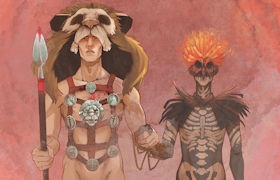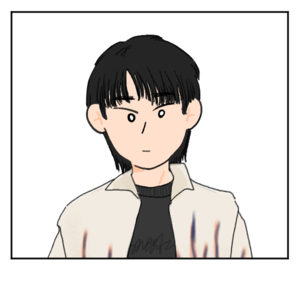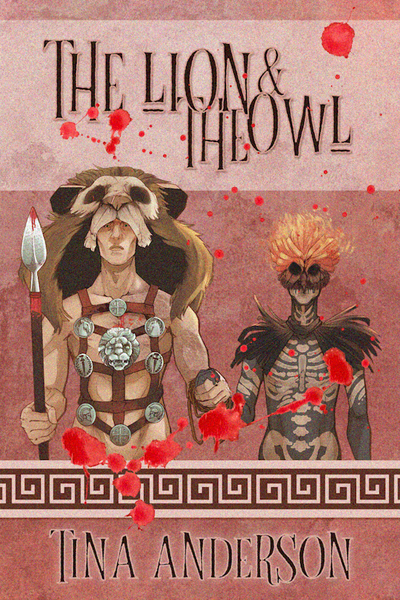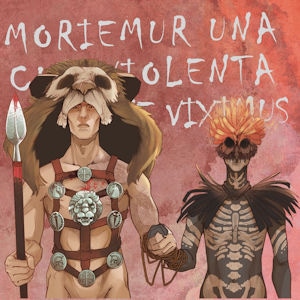Fish and mud taint the wind, yet no sign of a river appears.
With a metal stylus in hand, Vitus Servius sketches on vellum sheets, the leather strap around his neck attached to a flat board wedged in his belly. Cletus, his stallion, swats flies with his tail while trotting slow enough to keep his master’s hand steady.
Skipio snores upright upon his horse, a beast whose name eludes him, for he thinks only of Luna, his stolen mare.
“The wood ahead,” his father’s voice rouses him. “Thicker trunks mean deep water.”
A phalanx of narrow trees looms behind the haze, and the depth of the forest is a mystery in such flat terrain. Since his arrival on this island, Skipio has often thought of the towering peaks around their plantation. He left those orchards in his youth, not feeling much for what he considered toil and tedium. Now, he longs to swim the placid waters of his family lake and be shrouded in the pre-dawn mists that descend from the mountains.
At the tree line, the horses need goading to enter. Leafy branches provide a chilly respite from the sun, and the beasts trot over a narrow path only they can see within the gnarled roots. Hazelnuts crack beneath their hooves, an aromatic end that quells the mossy stench as Vitus surveys the overhead leaves, seeking this island’s rendition of a walnut tree.
Pears and apples may be the main Servii crop, but all of Rome prizes their walnuts. Skipio cares little for agriculture. Swimming distracted him first, and then horses, but eventually, Vitus sent him to live in their plantation village and work the land.
After a week of cleaning dirt from under his fingernails, Minerva answered his Liberia prayers. The day Skipio traded his boyish clothes for a manly tunic, Remus Plinius Castor, a former military equestrian turned scholar, came to the villa seeking students for his new school. Vitus wasn’t initially interested in such things for his son until Skipio chose to study drafting—a strategic move that appealed to his father’s vanity.
After five years of honing his abilities, it came time for him to return home—until Mars provided a new diversion. At the start of Skipio’s twentieth year, his father’s oldest friend, Julius Caesar, took control of their region. Declaring his newly built Comum a legal colony, he mandated that every man of a certain age serve two years in the legions.
Skipio quickly enlisted—anything to avoid working the land.
“You hear that?” Vitus asks.
The sound of rushing water filters through the trees.
“Always trust a thirsty horse,” he adds, smiling.
Free of their burdens, the beasts approach a gully where massive boulders edge curling water. They leave deep prints in the muddy riverbank and enter up to their cannons. Vitus joins them, shedding his boots and tunic.
His father’s nakedness is a frightening herald; once fit like his son, the mapmaker stands thick in places unfortunate. Skipio possesses his mother’s green orbs and bee-stung lips, yet he owns his father’s angular visage. Neither man holds dear the kinky Servii wenge, and both keep bare heads to avoid the ancestral curls.
While his father washes in the river, Skipio pitches their tents and digs a hole behind a tree for their toilet. He then clears the forest floor of sticks, depositing them into a shallower hole for their fire.
“Go wash up,” Vitus says, joining him. “Scrub those feet. There’s nothing these blasted mosquitos love more—”
“-than a foul foot,” says Skipio.
“I don’t need an orator,” says his father, dusting their camp with oregano and cumin, the only things capable of repelling this island’s ravenous breed of blood-sucking insect.
Skipio studies the waterline and finds the flow moving steadily—this promises a waterfall somewhere upstream, and if there are falls, there’s a plunge pool. He courses alongside the water, crossing a downed tree as his heart beats with expectation. A familiar rumble speeds his gait, and though the high falls prove narrow, the pond at its feet is wide enough to lap.
He drives his sword into the soil, hangs his helmet on the grip, and sheds his shin plates and tunic. He surveys the trees before removing his loin cloth. Noisy birdsong makes it difficult to listen for lurkers, and these waters aren’t as clear as those back home.
The chill seizes his thighs and tightens his balls, and before his resolve fails, he marches under. Dark fluid warms as he strokes to the other side, and the fall’s muted roar turns thunderous when his head treads to gulp new air. He flips near the opposite shallows, swimming back the way he came: five times across, then five more, until his heart drums in his ears.
Skipio rolls over, fanning out his arms and straightening his back. He pushes steadily in a backstroke row that propels him across the surface. Air nips his cresting toes while tree-framed skies entertain his eyes. After eight trips across and back, floats upright in a small patch of deep water.
Sunlight warms his scalp, the first tangible rays in many weeks that create a colorful patch over the fall’s churning feet. His breathing steady, he hears the birds go silent. Quickly, Skipio turns to find an unpainted Gaul watching from the knickpoint above.
Two dark nipples mark a boyish chest with hints of dark hair peeking from his underarms. Black curls overtake his thick brows but cannot hide his large ears. This lean observer displays no weapon other than an unpleasant face—but handsomeness isn’t vital if the man’s ass is tight.
Skipio drifts to the shallows, finding a stable stone. He rises from the water to his waist, revealing his corded torso. Cold eyes regard him in curious measure until the Gaul pushes his blue tartan pants down past his bony hips, revealing a black thatch upon shapeless obliques. Nestled within is a thick cock root.
The Gaul takes out his girthy shaft, and the sight of it wets Skipio’s mouth. He wonders if all the lanky men on this island are as well-endowed as the Owl and this prurient punk. As courtesy dictates, Skipio falls back with a playful smile and displays his sizable manhood, but the watcher’s gaze remains cold, even while his hand twists and pulls.
Skipio lets slip a soft laugh before opening his mouth and extending his tongue.
A mischievous gleam clouds the watcher’s eyes as he works his erection faster. His gaunt body tenses, and his breath shallows. Bars of sunlight invade like heavenly censors, obscuring his cock as it spits.
Lips turn down, and britches return to their place. Long fingers draw forth a thin knife, and he dares with a wave of it, his body language eager for a fight.
Skipio steps onto a shale, emerging to his thighs and happy to oblige.
The horse grunts, drawing the defiant Gaul’s attention to the bank, where a sword, helmet, and clothes reveal Skipio as Roman. He turns quickly to explain, but the Gaul is gone. Misfortune tastes bitter, and he slaps the water in anger. He’ll never know how the cock-heavy bastard takes a punch, or if his ass splits without oil.
*
Gnats crowd his face on the walk back.
Strange voices force him into the ground cover, where he spots his father hiding in a ravine directly under their camp. Vitus stills him with a raised hand while above, a robed woman and her brutes tear apart their tents.
The men scarf down their dried fish, and the woman wears their barley pouch rations around her neck. After looting the saddlebags, she unties Cletus and slaps his backside, sending him into the trees. Without cause, the other idiot beast races after him, taking Skipio’s swords and armor.
“Where do you think they went to?” one asks.
Skipio struggles to comprehend the Brittonic tongue.
“Down by the water, most like,” she replies, then barks, “Where you been?”
A dull voice responds. “Washing in the falls,”
Skipio raises his head for a peek and discovers the raunchy Gaul in blue tartan pants. He shares an obtuse jawline with the woman, but her long black hair is stringy and straight.
“Washing?” she smirks. “Or rubbing at yourself?”
He stares at her with contempt, as any son might a mother so crass.
“Get your poisons out, boy,” she teases. “None of this lot’s going to smack you around as you like,”
The men laugh, but her son remains stoic.
Skipio processes her words as best he can. He imagines slapping around the slender Gaul before taking a bite of his ass. Such thoughts threaten to stir his flesh, so he conjures images of Planus and Titus—anything to keep his cock from rising.
When the woman orders them to burn the tents, Skipio looks to his father and finds him clutching his maps to his chest, and their fire-starting kit tied to his tunic.
She gives her son’s big ear a gentle tug.
“Did you see any Romans by the water?”
He answers her loudly in Greek. “I saw no one by the water,”
“Answer me proper,” she grouses, “You know I can’t speak that gibberish,”
The gang departs and leaves nothing but burning tents.
**
After miles on foot with the forest far behind, their stomachs growl.
Like a brown serpent’s corpse, the portion of the river they seek twists over the landscape. Vitus leads him into reeds at its narrowest point before hunkering down to sketch their surroundings from sight.
“Farther west, there’s a settlement. An hour east is another.” He finishes his crude version of a map. “The woodland locals know we’re here, which means the settlements along the river will dispatch hunters.”
“You think they’ll find us?”
“Not if we leave now.” Vitus rolls up his illustration. “We’ll jog south to the coast and follow it back to the beachhead.”
“That keeps us out another two days,” he balks.
“Yes, and we’ll live to see more,” Vitus assures, “by avoiding the way we came.”
The jog lasts ten minutes before his father decides to march.
Vitus passes the time with word of his cousin, a Comum orator serving the Senate. Each new session brings greater hostility for Caesar, with wealthy senators heaping resentment upon those representing the man’s provincial cities.
“Fear not,” says Vitus. “I’d never ask you to serve in Rome.”
“Why would I?” he says. “Planus is more suited—”
“He is of the Caesares, and thus represents Mediolanum.” Their pace quickens as gulls fly overhead. “Long before their arrival, it was we Servii that quarried the stone, while the Flavii cleared the trees,”
“There’s far wealthier families among them than ours,”
“Despite our simple life, we are one of the wealthiest families.” Vitus stops walking. “Did you just refer to those in Comum as ‘them?’”
***
Under the half-moon’s light, they traverse the coastal plain, an endless flat with the occasional cluster of boulders. Father slumbers between the rocks while Skipio dozes outside.
By morning, they’re marching again.
At midday, they come upon a wooden trap that provides four rabbits—Vitus takes only two. On the coast, they watch the sunset before choosing their supper spot.
“You recall those white cliffs we saw sailing in?” asks Vitus.
“They were massive,” Skipio says, digging a hole for their fire with one of his shin plates, all that remains of his armor since the horses fled.
Vitus tosses him the fire-starter pouch. “We’re standing on them.”
“My Gallic horsemen say they’re made of bone.” Skipio cracks the two flint stones until a spark strikes the kindling-covered wool in the hole. Smoke wisps from the gnarls, and he blows upon them softly until a flame appears.
“They’re made of chalk.” Vitus removes the fur from the first rabbit with one powerful tug. “See that merchant bireme out there?” His son squints at the dark patch on the horizon. “She’s filled with slaves who’ve been picking away at it since we got here,”
“These cliffs are larger than those at the end of the world.” Skipio catches his father’s stare. “I know the Pillars of Heracles aren’t the world’s end, not anymore,”
“They never were,” Vitus grins, handing him a skinned carcass. “This sea is larger than the sky, Skipio. Mark my words, there’s more land beyond this island.”
Another of his shin plates lays over the flames, and he tests its heat with spit before laying the red, white-streaked flesh upon it.
The sizzle fuels his hunger and makes him bold.
“What happened to Vita after I left for Mediolanum?” When his father says nothing, Skipio presses. “She was to marry that—”
“—We’re not talking about your sister,”
“You won’t even say her name.” Skipio stares at his father’s back. “Did Vita shame us in some way?”
“Your sister would never disgrace this family,” Vitus says coolly. “That’s the last words we’ll have on it,”
“Can you at least tell me if Mother has improved?” he demands.
Mother fell ill shortly after their departure, and both men actively avoid reflecting on the inevitable with typical Servii avoidance.
“She’s taking care of herself.” Vitus says, sullen. “As she’s always done.”
Skipio takes his father’s distance as a coping strategy and let’s it pass. They make short work of the meal, and he pretends the bland, gamey meat is a flavorful hare from their kitchen back home. He misses Nikonidas, the boy he was raised alongside, who took over as the villa’s cook after his Greek father passed away.
“Is Niko still fat?”
“Your sister tells Planus he’s grown quite tall,”
“Is he still a mute?”
Vitus offers a look of displeasure. “His voice came as his mother lay dying, Skipio. He’s not mute, he merely doesn’t express himself like the rest of us,”
Skipio lets it pass.
“That Gaul with the others at our camp,” he says. “He saw me swimming,”
Vitus goes wide-eyed.
“We saw each other,” he adds. “But he said he saw no one,”
“It was careless, washing on your own,” scolds Vitus.
“He answered her first in Greek,”
“Then he knew we were hiding nearby.” Vitus then offers a humored glance. “You saw each other, did you?”
Skipio grins, and his father sighs.
“Tell me you didn’t interfere with him?”
“If I had,” he brags. “That bitch yelling about would’ve noticed,”
Vitus regards him sternly. “It’s one thing to never grow out of your attraction to boys, but this roughness of yours, Skipio, I do not understand,”
“You have things you don’t discuss,” he defends, “and I have mine,”
Vitus turns thoughtful.
“Planus never grew out of his attraction to men,” he says. “Have you thought of making a match?”
Skipio curls his lip. “With Planus?”
“He’s your sort, isn’t he?” asks his father.
“We’re the same sort,” balks Skipio. “But not sorted for each other,”
“In that case, you’ll get a wife,” his father decrees. “And you’ll ensure she knows nothing about whatever catamite you install at our insula in Comum,”
“Is that fair to her?” Skipio then mumbles, “Is that fair to me?”
“Life isn’t fair,” Vitus declares, standing to crack his back. “We make the best of unfairness with private diversions,”
Skipio keeps his tongue as rises, but as he kicks dirt over their fire, his father suddenly falters, hitting the ground with a thud.
“Father!” A sudden head rush forces Skipio to his knees. His face collides with the ground as his arms and legs disappear.
Eyelids drop as distant voices find his ears.
“I told you they would ride to the coast,”
“Yes, you did, my clever boy, yes you did…”













Comments (4)
See all